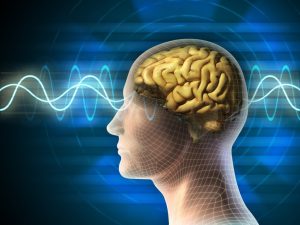Sleep is a phenomenon seen in all animals and humans, and we spend a significant time during our lives experiencing the state of sleep. When seeking to optimize health and wellness, sleep is an often overlooked necessity for good health. Unfortunately, with many individuals failing to achieve regular periods of deep sleep, health is compromised, and consequences occur.

When optimizing sleep quality and duration, the positive effects on the brain are profound. Similarly, the negative impacts on the brain of poor sleep are just as significant.
In what follows, we’ll discuss the four sleep stages and the associative brainwaves that correspond with each. Further, we’ll explore what exactly happens to the brain during restful sleep. Finally, we’ll share the ill effects of poor sleep and its impacts on brain health.
Stages of Sleep
Before achieving sleep, individuals often have a period of rest during which brain waves slow to a rhythm between the waking and sleeping stages. During this time, individuals may have their eyes closed but haven’t achieved sleep yet. However, some individuals are not able to experience this presleep stage.
When individuals eventually achieve sleep, they typically go through four stages of sleep. While each stage is important, all play independent roles in optimizing sleep quality, thus improving overall brain health.
The first three stages fall under the characterization of non-rapid eye movement sleep, while the final stage is defined as rapid eye movement sleep or REM sleep. The following is a detail into the four stages of sleep:
The Awake Stage (N1)
Upon first laying down to rest in bed, the awake stage of sleep involves the act of attempting to fall asleep. The duration of this stage depends on how tired an individual is and how fast they fall asleep. Many individuals can experience a prolonged time during this stage.
During the awake phase, alpha waves are produced at a low frequency. This results in a feeling of relaxation while still conscious and awake.

The Light Sleep Stage (N2)
Upon dozing off into a subdued state of unconsciousness, stage two is characterized by a slowed breathing rate, reduced heart rate, and reduced body temperature. Finally, reaching a fully relaxed state, theta brain waves promote the processing of information, ultimately leading to the “dream state.”
Lasting about 45 to 55 percent of the sleep cycle, stage two still includes some brain activity, thus making it fairly easy to be disrupted. Without disruption, individuals will ultimately reach the stage of deep sleep.
The Deep Sleep Stage (N3)
Arguably the most important stage of sleep and comprising about 10 to 20 percent of the sleep cycle, deep sleep is what’s required to optimize recovery and restoration, both physically and mentally.
Characterized by high amplitude delta waves, stage three sleep involves a dramatically reduced heart rate and breathing rate, resulting in a peak state of relaxation, making it extremely difficult to be disrupted and awakened.
REM Sleep (N4)
Otherwise known as the stage of rapid eye movement, REM sleep occurs in cycles, the first only lasting a few minutes while the final phase before being awakened may last an hour or more.
Unlike the first three stages of sleep, REM sleep is characterized by an increase in brain activity, heart rate, and breathing rate, commonly resulting in vivid dreams and periods of deep learning.
While dreams are a normal component of optimal sleep, it’s also been shown through research to be potentially beneficial for brain health and health in general.
Dreams are associated with the promotion of creative thinking, emotional processing, and memory. In addition, dreams have also been linked to the minimization of depressive symptoms and the reduction of stress and anxiety.
Importance of Sleep for Brain Health
Important to several brain functions, including neural communication, brain detoxification, and general cognition, sleep plays an integral role in the overall health and functionality of the brain.
Poor sleep quality will result in the opposite effects, increasing the risk of various health disorders, diseases, and blood conditions and increasing the likelihood of cognitive conditions such as depression.

Further, sleep deprivation dramatically disrupts emotional and cognitive ability, increasing the risk of developing psychiatric and neurological disorders.
Accounting for 25-33% of the entirety of the human lifespan, sleep is vitally important for the quality of life, significantly impacting brain function if it is neglected.
Final Thoughts
Vitally important for both the brain and the body, sleep is a pillar of health that cannot be ignored. Not only are the positive effects of sleep undeniable, but the negative impacts of a lack of sleep should be avoided.
There are many methods to improve the quality of sleep, and they mostly involve lifestyle interventions. Seeking to achieve 7-9 hours of sleep on a frequent and consistent basis will allow the brain to flourish.
